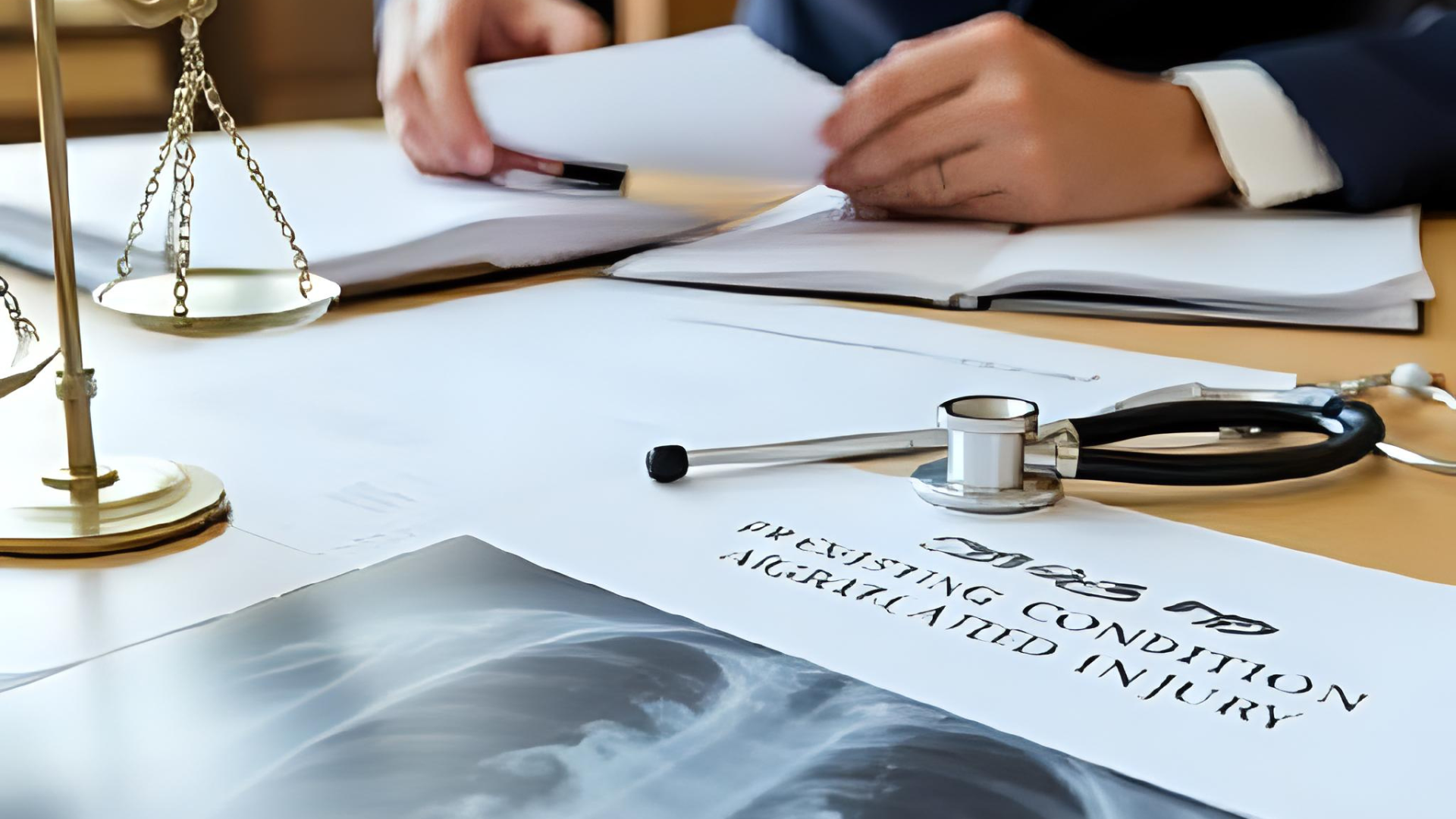Pre-Existing Conditions in Florida Car Accidents – Ask Smith & Valentine Law
Navigating the aftermath of a car accident in Florida can be daunting, especially if you have a pre-existing condition. You’re probably wondering how this impacts your ability to claim compensation. Good news—having a prior condition doesn’t automatically disqualify you. According to Florida law, if a car accident aggravated your condition, you’re entitled to pursue compensation. Insurance companies may try to argue otherwise, but don’t let that ruffle your feathers. It’s crucial to prove that the accident worsened your condition. Engaging a skilled car accident lawyer can fortify your case. They will ensure your rights are protected under the eggshell doctrine. Let’s explore how you can strengthen your car accident claim.
Key Takeaways
-
Florida law supports compensation claims if a car crash worsens a prior condition.
-
Disclose all pre-existing conditions to your attorney to strengthen your case.
-
Insurers may use your medical history to offer low settlements.
-
Legal experts can help connect the car accident to your aggravated injuries.
-
The eggshell doctrine protects victims, ensuring claims aren’t reduced due to pre-existing conditions.
Defining Pre-Existing Conditions in Injury Claims
Navigating pre-existing conditions in injury claims involves understanding how they interact with new trauma. Whether it’s a nagging back pain or a herniated disc, these conditions often lie dormant until a Florida car accident awakens them, like a sleeping giant. In such cases, the aftermath isn’t just about the crash itself but how it exacerbates what was already there. The law shields victims by ensuring compensation isn’t diminished due to these existing issues. We’ve seen it all—chronic pain that becomes unbearable, arthritis that suddenly flares up, and more.
A car accident lawyer plays a pivotal role here. They’re the ones who sift through medical records, piecing together a narrative that supports your car accident claim. We must tackle the insurer’s tactics head-on. They often dive into your medical history, attempting to unravel your claim. Our job? To ensure they don’t get away with it. The reality is, the car accident aggravated the condition, and it’s crucial that this is highlighted. Remember, in the world of injury claims, documentation is your best friend.
Florida’s Eggshell Doctrine Explained
The essence of Florida’s “eggshell plaintiff” doctrine is intriguing. It ensures full compensation for individuals, even with a pre-existing condition, if a Florida law incident worsens their state. Think of it like this: if an egg has a tiny crack and someone causes it to shatter, that person should face the consequences, right? Similarly, in a Florida car accident, the law places the burden on the person responsible for the mishap, especially if it was the one that aggravated a condition.
When a car accident lawyer steps into the ring, their mission is clear-cut. They must illustrate how the collision aggravated your state, especially if insurers try to muddy the waters. The stakes are high, as these companies love spinning tales about your medical history.
We understand the challenges of a Florida car crash. Pain that was manageable before may now become intolerable. To see how experts address these issues, check out Brandon J. Broderick’s insights on Instagram.
How Car Accidents Aggravate Pre-Existing Conditions
Understanding how collisions worsen pre-existing conditions is crucial for those involved. Accidents often escalate issues like chronic pain, demanding further medical care. This isn’t just a minor flare-up; it’s a significant change that impacts daily life. Imagine dealing with an old knee injury suddenly making you wince at every step. That’s the kind of aggravation we’re talking about. Such situations require more than just aspirin and a brave face.
In Florida, handling these matters requires astute legal representation. Insurers may try to sidestep liability by attributing your discomfort to past issues. This is where a car accident lawyer becomes invaluable. They draw a clear line from your mishap to the current agony, ensuring your car accident claim reflects the truth. Picture this: your life was a balancing act before, now it’s a tightrope walk without a net.
For a deeper dive into strategic handling of pre-existing conditions, exploring resources like Brandon J. Broderick’s insights on Twitter can be enlightening.
3 Steps to Strengthen Your Claim
Strengthening your claim involves a few strategic actions. First, sharing your full medical history with your attorney is paramount. This ensures they understand which pre-existing condition might worsen due to the incident. But let’s keep the insurance folks out of this loop initially. They might twist the narrative, turning your pain into a mere page in your medical records.
Second, seeking immediate medical attention post-incident is akin to planting the flag on the moon. It’s your proof of the event’s impact. Document everything—every ache and every medical visit. These records become your strongest ally in proving how the accident aggravated your condition.
Lastly, involving medical experts who can corroborate your claims is crucial. They lay the groundwork for linking the collision with the aggravation of your condition. Their testimony can distinguish between a simple flare-up and a genuine aggravation caused by the Florida car crash. These steps create a robust case, pushing back against any insurer tactics trying to diminish your experience.
Insurance Tactics on Pre-Existing Conditions
Insurance companies employ tactical maneuvers to scrutinize your medical history. They dig deep into your past, seeking any hint of a pre-existing condition. Their aim? To argue that your injuries were not caused by the recent vehicular mishap but were mere echoes of an old ailment.
We’ve seen them offer settlements that barely cover a cup of coffee. They hope you’ll accept without a fuss. But don’t be swayed. With determined resolve, we can tackle these challenges head-on.
To counter their tactics, it’s pivotal to have comprehensive medical documentation. This documentation is the key to demonstrating how the accident aggravated your existing condition. Medical experts, like skilled painters, must illustrate the stark difference in your condition before and after the incident.
When filing a car accident claim, our strategy should be clear. We’ll push back against insurer arguments with unwavering evidence. By showcasing the undeniable link between the incident and your worsened state, we can ensure your rightful claim isn’t lost in a shuffle of paperwork.
Legal Strategies for Compensation Claims
Crafting effective legal tactics for maximizing compensation involves a blend of knowledge and strategy. Addressing the challenge of proving that a Florida car accident pre-existing condition was worsened demands strong evidence. We need to present comprehensive medical records and expert testimonies that clearly articulate how the incident intensified your condition. It’s like piecing together a puzzle where every detail matters.
Insurance companies often play hardball, scrutinizing your medical history like detectives. Their aim? To minimize your claim by attributing issues solely to past conditions. We counter this by showcasing the transformation in your medical state post-incident. Our goal is to leave no room for doubt about the accident’s impact.
Legal representation is our armor against these tactics. We’ll engage specialists to back our claims, ensuring that the truth shines through. Our commitment? To fight tooth and nail so that you receive the compensation you deserve. By aligning with us, you’re choosing a path toward justice and closure. It’s a journey worth taking together.
Seeking Legal Assistance in Florida Car Accidents
Gaining legal support after a mishap on Florida’s roads can be invaluable, especially when dealing with a pre-existing condition. We find attorneys indispensable, as they tackle insurer tactics that attempt to diminish claim values. Their expertise ensures that a prior condition doesn’t overshadow the accident’s impact. Medical records and expert testimony play starring roles in demonstrating how the incident genuinely intensified a condition.
Insurers? They’re like detectives, hunting for ways to pin injuries on past issues. Our legal allies? They’re the defense team, countering insurer narratives with evidence that highlights the accident’s role. This ensures that any aggravationlinked to the collision is acknowledged and compensated.
Legal support doesn’t just involve paperwork; it’s about understanding rights under Florida’s eggshell doctrine. Attorneys engage with insurers, securing fair compensation for the aggravated condition. In this legal maze, having competent representation is not just helpful—it’s essential for justice. Let’s face it, navigating these waters alone would be like sailing without a compass.
Conclusion
Navigating the legal maze of pre-existing conditions in car accidents can feel like trying to find a needle in a haystack. Yet, it’s a journey we must take with diligence. The road may be bumpy when insurers scrutinize every detail, but having a clear strategy empowers us. Our goal? To ensure justice is served and fair compensation is achieved.
The eggshell doctrine is our ally, holding defendants accountable for the full extent of injuries. By arming ourselves with detailed medical evidence and expert testimony, we stand a fighting chance. Legal guidance isn’t just beneficial; it’s necessary. Attorneys can be our compass, guiding us through the complexities of Florida’s legal system. Together, we can turn the tide, ensuring our rights are protected and our voices heard.
FAQ
-
How does a pre-existing condition affect my car accident claim in Florida?
Pre-existing conditions can complicate claims. Insurers might argue your injury wasn’t caused by the accident. But Florida’s “eggshell plaintiff” doctrine steps in here. It ensures defendants are responsible for worsening any prior condition due to the accident. We’ve got your back.
-
Can insurers really use my medical history against me?
They sure try! Insurers dig deep into records, looking for anything to say your injuries aren’t their problem. They might offer lowball settlements, suggesting your pain is from old issues. That’s why it’s crucial to have records showing the accident’s impact on your condition.
-
What should I do if my pre-existing condition worsens after an accident?
First, see a doctor. Immediate medical attention can establish what’s new or worsened. Keep detailed records of your condition pre- and post-accident. This documentation helps us prove the accident aggravated your condition, strengthening your claim.
-
How can legal help assist with my car accident claim?
We handle the tough stuff—insurers, paperwork, and the legal maze. Our job is to ensure your pre-existing conditions don’t reduce your claim’s value. With our expertise, we’ll help showcase how the accident impacted you and argue for fair compensation.
-
Why is the “eggshell plaintiff” doctrine important to my case?
This doctrine is your ace in the hole. It holds defendants accountable for full injury extent, no matter your prior condition. Without it, they might try to shrug off responsibility for worsening your situation. It ensures you get a fair shake.






